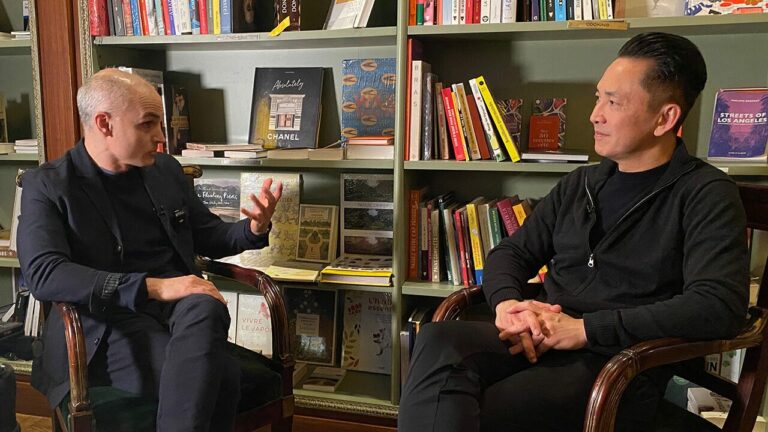SINGAPORE – F. Scott Fitzgerald, author of The Great Gatsby, did not have to translate what a sandwich is to his readers. In the same way, a Vietnamese-American writer should not have to explain what pho is. Pulitzer Prize-winning author Viet Thanh Nguyen on Nov 18 said that the people he is writing for – himself and Vietnamese people – do not expect the translation, and that others can expend the effort to “crawl inside the voices” of non-white writers, just as non-native English speakers do when they read Fitzgerald and Jane Austen. Clement Young writes about Viet Thanh Nguyen and his take on the Marvel universe and opinions on AI for The Straits Times

Nguyen, author of spy novel The Sympathizer (2015) and its Parisian sequel The Committed
(2011), was speaking at his festival keynote for the Singapore Writers Festival (SWF) at Victoria
Theatre.
Beginning with how he spent a lot of time as a child reading alone – his parents were always busy
running their grocery store – he integrated his personal life with a broader critique of America,
reaching the conclusion that there are two main tasks for Asian-American literature today:
“writing as fighting and writing as grieving”.
He moved to America with his parents when he was four, after the Communist regime in
Vietnam overwhelmed Saigon, today Ho Chi Minh City. He still refers to himself as a refugee.
The more neutral “immigrant” obscures America’s role in waging war overseas and creating the
violent conditions in which Asian peoples had to be displaced. It also feeds into the trope of the
“model immigrant” that validates the American dream.
He said: “Even if they acknowledged these crimes, many Americans say they do not take away
from how the United States is the land of democracy, freedom and opportunity. Both realities can
be true at the same time, and our challenge is to think about them simultaneously.”
Writing involves making private fights and grief public, and sometimes entails betrayal, as he has
by writing about his mother’s visits to a psychiatric institution.
“But grief is also a door that we can choose to shut or open,” he said. “Opening the door allows us
the possibility of a more capacious grief, the recognition that what we grieve and what we mourn
is not unique.”
Another SWF panel saw three women from the United States and the United Kingdom
addressing similar concerns based on their work for Marvel.
Fatimah Asghar is co-producer and writer of Time And Again, an episode in Disney+ series Ms
Marvel, which pulled the story back to the partition of India in 1947.
Dr Eve L. Ewing is the first woman at the helm of the Black Panther comics, and Bisha K. Ali is
the head writer of Disney+’s Ms Marvel and was an executive story editor on Loki, also for
Disney+.
The trio clearly had a rapport – in the case of Asghar and Bisha, honed after months of watching
each other fight with executives to get a chance to tell their stories.
Asked by an audience member if they ever felt “impostor syndrome”, Dr Ewing said to laughter:
“Once you get in the industry and you see how mediocre a lot of your colleagues are.”
She continued that brown women – and marginalised writers – should not have to feel that their
works bear the weight of their entire community. “There’s a million extremely bad stories about
white people and the entirety of white people are not embarrassed by that.”
Bisha cautions that people often assume that minority writers write from direct experience only,
and are made to feel as if they do not have imagination beyond their own lives.
Asghar says there should be more focus on the women’s craft. “Everyone can throw their racist
stuff at you, try to get you to doubt and feel like you’re not worthy of being in that room, But we
can say, ‘No, I know exactly what I’m doing’, and that takes rigour and the kind of clarity that
comes only with practice.”
On Nov 17, an understandably biased crowd deemed humans to be better writers than artificial
intelligence (AI) at the SWF opening debate, which starred ChatGPT as the closing speaker.
The motion, “This House Believes AI Is The Better Writer”, was always going to be an emotive
one, and temperatures rose during a question-and-answer interlude. Moderator Shamini Flint
broke in with a timely reminder: “This is the SWF. It is not Parliament. This is a meaningless
debate.”
The proposition – deemed the “suicide squad” by opening speaker Colin Goh – acquitted
themselves well and were the more creative quartet.
Malaysian writer and spoken word poet Melizarani T. Selva almost had the crowd switching sides
when she made the unorthodox argument that one must first be a good reader to be a good writer
– and who is a faster and more indiscriminate reader than AI, which is able to ingest Bollywood
King Shah Rukh Khan in Hindi and use it to write a better dating profile than most mediocre
men?
Selva averred: ”You will be inspired to become the man AI writes you to be. And isn’t the better
writer the one who empowers us to improve ourselves?”
Exuberance aside, there was a hint of wistfulness with the debate dedicated to the late lawyer
and author Adrian Tan, who traditionally made closing arguments for the opposition.
In his place, actress entrepreneur Oniatta Effendi made the plea that “we can lose writers to the
inevitable thing called death (but not) because a robot took over”.
Joshua Ip then brought the inevitable victory of AI forward by getting ChatGPT to issue rebuttals
in the style of variously the Bible, Confucius and Muppets’ cookie monster – voiced in the
appropriate accents by his brother Caleb Ip.
He ended by asking ChatGPT why Tan’s words would remain, to which it responded in a moment
of poignant solidarity: “As humanity fades, his wisdom stays/In the virtual realms, his voice still
sways”.


